|
|
Joseph Dispenza- Mogul and Monklive on the earth so lightly that nothing is left of you except some footprints
|
| Joseph Dispenza is at once great and simple.
His accomplishments are large. He founded the film department at the Santa Fe University for the Arts in New Mexico and cofounded LifePath Center for Learning, Healing and Retreat here in SMA. However, his personal philosophy is "that you live on the earth so lightly that nothing is left of you except some footprints."
Joseph is both rich and poor. He has counted many Hollywood luminaries as friends and "employees," yet has lived his entire adult life as if still under a vow of poverty taken 50 years ago.
Joseph is soft spoken. He knows how to keep his mouth shut, having kept silent for a full year. Still, he is a wordsmith, publishing 16 books on a variety of topics (Amazon.com) and countless magazine articles.
Joseph is a traditionalist gone beyond traditions; once a Trappist monk, his recent book, God on Your Own is subtitled Finding a Spiritual Path Outside Religion.
In his twenties he practiced celibacy for over 8 years and now at 70 is married to a man 30 years his junior.
He is both earthy and spiritual.
I first learned of Joseph Dispenza when I joined LifePath's mailing list and began receiving profound weekly inspirational thoughts excerpted from his work. (LifePath's Article page has an interesting selection of his writings.)
Meeting him recently for the first time for this interview, his presence, mature and youthful, weighty and light-hearted, was in concert with the deep richness of his written work and, no doubt, the retreats he leads.
We met on the afternoon of his birthday.
This interview is my present to him, to you and to myself.
- Dr David Fialkoff
www.sanmiguelevents.com
|
| |
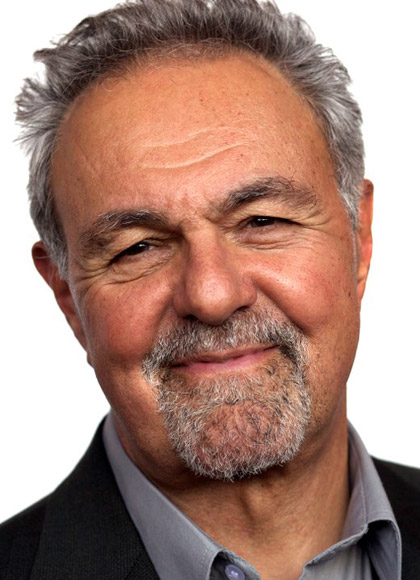
|
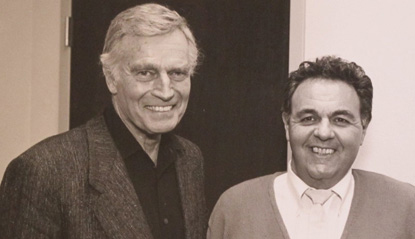
Joseph with Charlton Heston
|
|
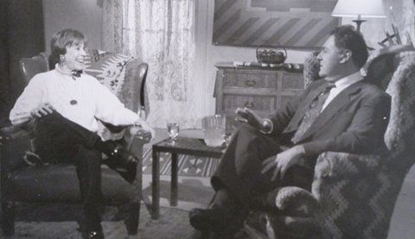
Joseph with Carol Burnett
|
It will be 12 years in January that we started LifePath, Beverly Nelson and I and Mike Herbert, my partner, who is naturopathic doctor now. I was supposed to come down here and retire. I had already had several lives. I thought, well this will be nice; I'll kind of lie back and we'll run some retreats. But I've never worked so hard in my life.
***
I was a monk for 8 years, a professional religious man. During the last year of high school all the kids in our little town in Ohio imagined what they would do; this one wants to go to college, that one wants to take over his father's barber shop. I thought, what I really want to do is get out of here, get out of a town of 25,000 people and see what's out there. It was a Catholic high school. One or two of the nuns encouraged me to consider what it would be like to lead a religious life. A recruiter from an order of teaching brothers appeared at career night. I felt like I was cut out to be a teacher. The first year was a year of silence, the canonical year. We lived like the Trappist monks of Thomas Merton, taking the vows of poverty, chastity, and obedience. But the first year was the year of finding out if we really wanted to do this, because it was an extreme way of living.
[Editor's note: This is a link to a recent article by Joseph in Spirituality & Health magazine on the monastic practice of silence.]
I've always thought you don't need to have religion to have monasticism. If you look around today what we have and what we've had for centuries is a monasticism attached to religion, Buddhist monks, Catholic monks. It seems to me that there's no reason that someone shouldn't come up with some sort of secular monasticism. I was reading a book by Morris Berman a few years ago; he writes about the decline of America; he's a wonderful writer who lives in Guanajuato. In one of his books Morrie talks about what he calls 'the monastic option.' Culture is falling apart all around us; we see the deterioration of money systems, of food supply systems; we're eating junk because that's what they're feeding us.
|
We just got back from the States. People there are as big as refrigerators. It's sad, and in a way it's not their fault. Certainly, we all need to take personal responsibility for our bodies - but it's difficult in our culture. The thing is that even when you pick and choose among bad food you're still eating bad food. It's just awful. It's processed. Even food, like spinach; well the thing is that those fields that the spinach grew on have been dead for years, the land has been dead. The chemical companies come in and put all this stuff down, it's growing on chemicals and that's what we're eating, which is why I've always been in favor of the organic movement. Actually growing your own food is probably the best way of doing it; keeping a field fallow, every 4 years; you don't grow something so it can start breathing again. Otherwise it chokes and dies.
All the systems break down, social economic agricultural, etc., all of the established cultural things that we built. You see what's happening in Mexico here with the drugs. It's chaos. There are whole states that are in absolute crisis, totally failed, people dying left and right and being killed. The idea would be then that people would opt to create these secular monasteries where they might do the same things that the monks in the middle ages did, collect the information somehow that shouldn't be lost, preserve the wisdom and good writings, get rid of the bad writings. As a writer have seen the evolution of publishing to where it is. It's dazzling. Anybody can publish a book. A monkey can. And if a monkey hired the right publicist, he'd wind up on the NY Times best seller list. So someone's got to weed it out. The monks weeded out. They created or preserved the medicines that we have now. They were the ones who kept that tradition, brought it in, developed it to a high art. We had an apothecary in my monastery. They preserved Western culture; the music and all of the other arts were preserved. That may become an option for us.
|
|
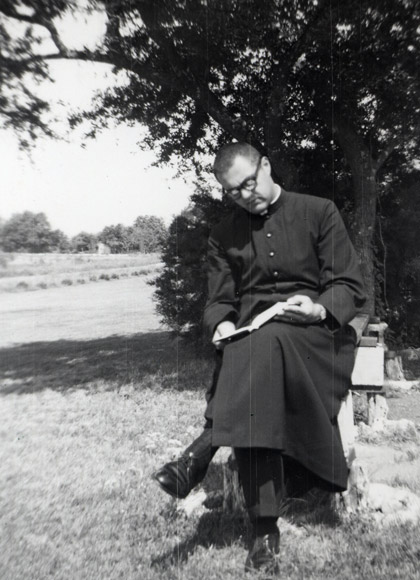
|
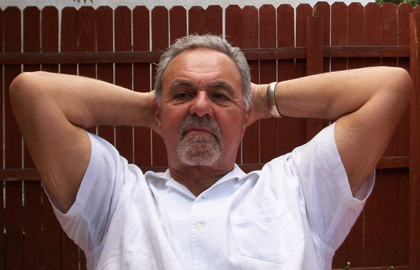
|
|
I guess the reason that I'm talking about it so much is that, that probably is somewhere around the core of who I am, that being the secular monastic idea. Even after I left the monastery I always considered myself a monk in the world. And I still today, people kid me but I am really trying to do it, I do practice poverty. That is to say, I'll keep a pair of socks until they've been darned 12 times and they can't be used any more. That is what poverty is. Devout poverty is about no personal ownership of any kind, and secondly about using something until it can't be used anymore. No waste. And the Zen part of that is that you live on the earth so lightly that nothing is left of you except some foot prints.
|
|
I created a film school in Santa Fe in 1987 and immediately I was in the middle of a Hollywood mindset, because so many of the older Hollywood directors, producers and actors who weren't working as much anymore had relocated to Santa Fe. I suddenly had this enormous pool of talent, of people who had nothing to do, who were absolutely at the top of their field: movie actors, TV directors, film directors, musicians for film scores, screen writers... They all came knocking on my door and said "Can I teach for you?" I said "Well yes, I work on the principle of inclusion, come on in."
The school was a huge complex. We turned the underusedbasketball courts into sound stages. Before the paint dried, Billy Crystal was there shooting "City Slickers." I had second-semester freshmen getting screen credit on Hollywood films. It was absolutely mindboggling and it's still going on. Greer Garson gave me the money to do it, $3.3 million. She had a home in Santa Fe. It's called now the Santa Fe University for the Arts. There already was a great performing arts and an acclaimed art department; I created the Moving Image Arts Department.
Shirley McLane, who has a home outside Santa Fe, offered to speak to students about film acting. I had Fred Steiner, who wrote music for the original Star Trek series, teaching a course in the history of film music. Chuck Jones, the legendary cartoonist, taught them how to draw Bugs Bunny. Karen Grassle, who played the mother on "Little House on the Prairie," taught acting courses. Tab Hunter spoke to the students about making films under the studio system; Carol Burnett held master classes on comedy; Julia Cameron, who would go on to write "The Artist's Way," taught creativity to my in-coming students; Brooke Shields dropped by, as did Molly Ringwald. The students got lessons from Ralph Levy, who had directed the "I Love Lucy" TV show, and from Jordan Cronenweth, the cinematographer who shot "Blade Runner." Charlton Heston, who did not live in Santa Fe but was a frequent visitor, came one day. Under his arm he had a couple of video cassettes. He said, "I want to show your students the chariot race from "Ben Hur," I'm very proud of it." Immediately all the kids started buzzing around like bees.
|
|
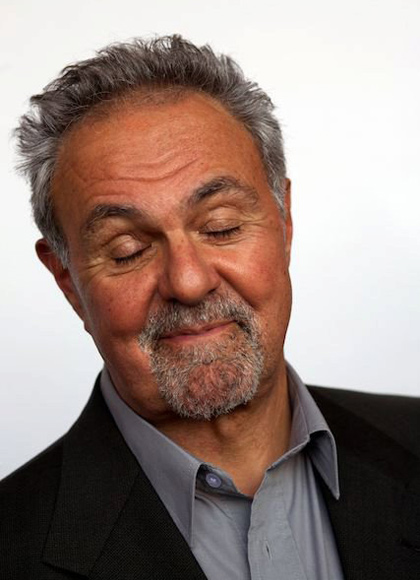 |
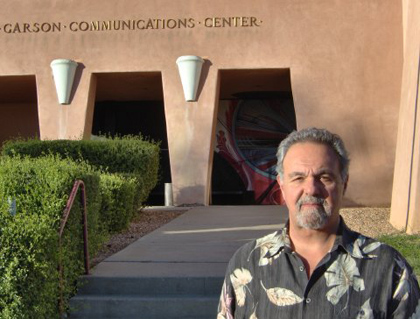 |
|
That kind of excitement was going on all the time, but I would still go home and live like a monk; there was nothing in the refrigerator. I had like a bottle of milk. I lived pretty much like a monk all during that time. I remember once I was at Albertson's, the supermarket. I was in line and in front of me was Joyce DeWitt, the gal who was in Three's Company. Behind me was Marsha Mason the famous movie star, who had just gotten divorced from Neil Simon. We kind of tapped each other on the shoulder and just started giggling; Oh what are you buying Joseph? Oh I'm buying celery, oh ha-ha. I was just in those kinds of circles. It was really quite wonderful.
As the head of this film school I was sort of a celebrity in my own. We all just laughed because here we are these fabulous celebrities, supposed to be these big deals on the cover of Us Magazine and we're buying celery and we're buying TV dinners and such.
When Monica Lewinski went on SNL, a friend of mine, Tom Shales, who holds the record for the longest tenure of any TV critic, wrote the next morning in the Washington Post, "She doesn't seem to know what she's famous for." I thought, ha-ha, of course she doesn't, she's clueless, as are most of these celebrities.
|
|
I had been in practice for a long time as a spiritual counselor. People would come to me and say, "I'm desperately unhappy," and I knew they were millionaires, maybe 10 times over. You would think it's almost a cliché, that money doesn't buy happiness, and yet people are still trying to do it. It's curious to me, isn't it to you? I was able to walk away from it pretty quickly and easily and not miss it at all. I never missed it. I must have had money in a previous lifetime because it doesn't impress me.
|
|
After, I was looking for a writing project to do. Friends told me about this woman who lived in mountains of northern New Mexico, Hazel Parcells. She had practically invented the science of nutrition in the 1930s. She called it the chemistry of foods. She almost died from TB when she was 40. She made herself well through diet. Once she got well she didn't know how she did it, so she traced back what she was eating. She had been eating spinach like a cow eating grass. She found out that it was the folic acid in spinach that healed her. It was a miracle for her body's chemistry. Once she found that out, she began doing more and more research about that. She became this very wonderful, wise teacher.
When I met her she was 102 and still very much on the go. After breakfast she would get on the phone for 6, sometimes 8 hours, with people giving them advice. That's how she made her money. It was not easy work. She had tremendous stamina. She would break for lunch, take a little nap and she'd go right back to work until sundown. She was a great role model, great teacher, amazing teacher.
|
|
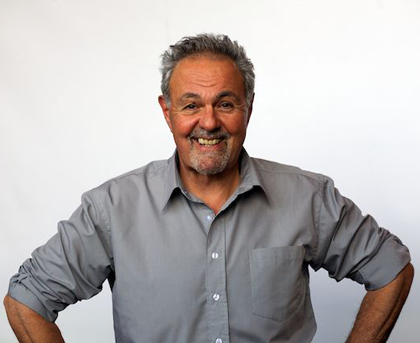 |
|
During that time I said "Doctor," (she was a naturopathic doctor) "I'd really like to get all this in a book. You have all this material." It was spread out, written down mostly on onion skin and carbon paper. I also did a lot of interviews with her, one a day, a different topic every day. The book came out after she passed away at the age of 106 and a half. Originally I had written it in her voice. HarperCollins got back to me about a week after she died and said to me rather indelicately "we don't publish books by dead authors." I said, well what do we do now? The editor there said, "You need to transpose everything there into your voice and report it." I did and that's what came out, under the title "Live Better Longer." [Much later, I published the original book as "Healer: The Pioneer Nutritionist and Prophet Dr. Hazel Parcells in Her Own Words at Age 106."
I'd listen to her on the telephone; it'd be very common to overhear something like, "Honey, you are never going to get over this liver cancer until you forgive your sister." Here was this wise old doctor and somebody had given her money to tell them what to do with their lives, not just their medicine, but what to do with their lives. I stayed with her. I lived with her. Her home was this log structure way in the mountains.
|
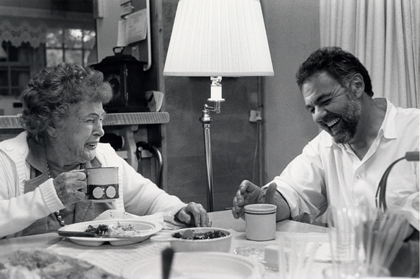
Dr. Parcells at the age of 105 in 1995
|
|
Dr. Parcells was an absolutely remarkable person. At the age of 75 she started a business providing vitamins and herbs to what she called her students; she never called them her patients, because she was always one step away from the FDA and all those people. She had been in jail many times because she used to go out in the 40s and talk to women about contraception. She would tell these poor exhausted farm women about condoms and diaphragms, how to avoid having children. They were like, "Oh my God, you mean I can avoid having children?!" It was at that point that the sheriff would arrive and arrest her and she'd spend the day in jail and someone would go get her out.
She was just an amazing woman. There were a number of women who emerged around the same time, Hulda Regehr Clark, Johanna Budwig, and others. They all had natural remedies for big problems, like cancer. No one in authority would listen to them but they would still go at it. I consider them the advance guard of the angels, of the feminine principle. Astrologers believe that we're swinging back to the feminine principle. Twenty or thirty years ago people rolled their eyes. But now we have women head of state, women are running corporations. The feminine energy is coming out. There's more estrogen now on the planet than. Men are becoming softer, gays are being accepted more.
|
|
I had cancer last year, lymphatic cancer, all over the system. When I saw the results of the baseline PET scan I almost fainted. I had kind of fallen up against the doctor and he had to pull me back up again. The scan was all black. As a Virgo I just freaked, how could I be dirty? and it's going after my liver. It was very quick coming on and it was very quick going. One day I noticed a lump, thought, hmm. The doctor wisely insisted I start treatment immediately it was days away from going into internal organs. I had chemo for 6 months, 5 treatments, devastating. Mike and I wrote this new book, "The Chemotherapy Diet." Mike researched it, and I essentially wrote it. It's a program to supplement the diets of people who are on chemo.. It's also a cancer prevention guide. There's very really little out there, people on chemo who want to know, what should I be eating and what should I be taking in terms of supplements. I was the guinea pig and Mike worked out that whole thing during the 9 months of my illness. Oncologists will always tell you, no supplements. It's one of the rules and we just ignored that. Bless their hearts, they are very good at the chemo and radiation thing and it works. I believe that by the second chemo blast I didn't have any cancer in me. Chemo can do this, but you've got to build your immune system back because chemo will take away not just the cancer cells but everything else. The chemo itself made me so sick and so tired. It just took everything out of me.
I was drinking over a gallon of green tea every day. I was doing all kinds of Chinese herbs, all kinds of vitamin supplements; the diet was 75% vegetables; no meat, just nuts. Mike totally changed the inner environment of my body, which had created lymphoma. We had been reading a lot about Dr. Gonzalez in New York. He will take cancer patients and if they're vegans, he'll have them eat red meat and they'll get well, by changing the environment, chemistry. It's absolutely wonderful, pure work. He's been funded now to do some really tremendous studies.
|
|
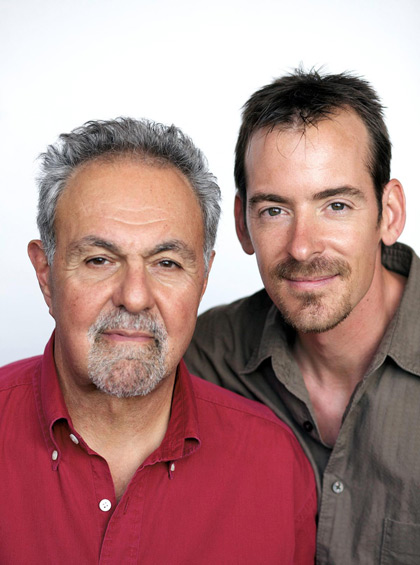 Joseph and Mike Joseph and Mike |
|
Dr. Parcells was very big on changing the environment. She would always say, "Look at the environment that this has. If you change the environment then you change everything." She basically was doing the same thing by telling people, "Well are you eating carrots? No? Well start eating carrots," changing the chemistry of the body. And they would suddenly have these tremendous positive changes. Go stretch yourself, get out of the envelope.
***
By the way today is our fourth wedding anniversary. My book "Older Man Younger Man: A Love Story," is about age, the aging process, trying to latch on to some ageless things. In the book I go into imaginary past lives, I imagine past lives with him. For me that was the most fun part of writing the book. It's all italicized in the book. With Mike and me there's an additional element, a very bittersweet element, since I'm 30 years older than he is. Therefore the older I get, the closer I get to not being with him anymore. My fervent wish and desire is that we will just continue having this relationship forever, until we just get sucked up by the white light. I believe in future lives and past lives, that our souls are big diamonds and each facet is a lifetime. Generally, I anticipate future lifetimes with great relish. What I'm not looking forward to in another lifetime is second-grade. I had a teacher I was afraid of. I had a terrible time.
|
|
|
|
|
|
|